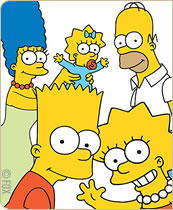 “The Simpsons” movie may not have lived up to it’s almost-two-decades of build-up–could it possibly have?–but I laughed my way through it nevertheless. From Homer’s “Spider Pig” song to Bart’s full-frontal-nudity skateboard trip through town, to Marge and Homer’s romantic interlude in Alaska, the movie hit all the right notes that we’ve come to expect from the show–though I left wishing I’d seen more of typical Springfield, like Apu and his Kwik-E-Mart and Principal Skinner and the school.
“The Simpsons” movie may not have lived up to it’s almost-two-decades of build-up–could it possibly have?–but I laughed my way through it nevertheless. From Homer’s “Spider Pig” song to Bart’s full-frontal-nudity skateboard trip through town, to Marge and Homer’s romantic interlude in Alaska, the movie hit all the right notes that we’ve come to expect from the show–though I left wishing I’d seen more of typical Springfield, like Apu and his Kwik-E-Mart and Principal Skinner and the school.
But unlike fellow Idol Chatter blogger Donna Freitas, who describes her boredom with the movie being punctuated by only a few moments of laughter, I found the movie funny throughout, albeit slowed down by a few stretches that dragged.
More to the point for our purposes here, the movie extended the TV series’ propensity for poking fun at religion and religious people–mercilessly, intelligently, and fairly, even lovingly.
Toward the beginning of the movie, we see Grandpa rolling on the floor in church babbling incoherently. Homer searches unsuccessfully for help from his Bible, and the congregation ignores what happened–while Marge takes her family and congregation to task for treating Grandpa like a loon and denying that a genuine religious experience took place that morning in church. For everyone else, though, the buttoned-up First Chruch of Springfield is hardly a place for such a spontaneous and emotional display.
Which brings us, of course, to Ned Flanders, the Simpsons’s much-mocked neighbor and the gosh-darn nicest evangelical you’ll ever meet on TV. Even as the movie repeatedly skewers poor good-natured Flanders, he comes off more sympathetically than ever, proving to be an alternative father figure for, of all people, Bart. We see the true goodness underneath his almost-eerie cheeriness.
There were other memorable religious moments–like a Native American vision quest ritual of sorts–but ultimately, the deepest spirituality in this delightful, and delightfully light movie is the same as on the show: The love that underlies all the schemes and conflicts the Simpsons face. It’s what makes the show work, even amidst the ups-and-downs of its humor quotient. It’s why we embrace Homer and Bart as more than just troublemakers or worse. And it–along with a hilariously sharp satiric eye even when at its worst–is why we love these yellow animated characters as much as we do.
To see the Top 10 religious episodes of “The Simpsons,” click here.


